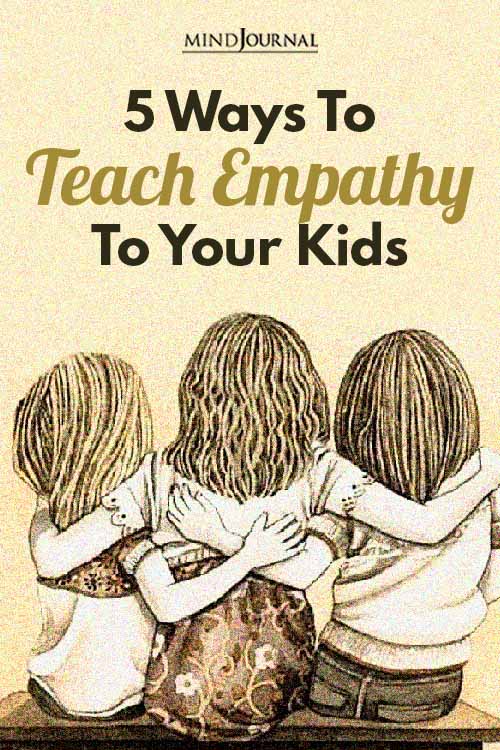Compassion is the key to happiness, empathy is the first step towards it. Empathy is a blessing not everyone is born with. How to teach empathy to your kids then?
Can empathy be learned? Yes, if hatred, bias, and other negative beliefs can be learned, so can empathy, love, or compassion. But how can empathy be taught?
It takes time to develop a degree of empathy to qualify as a true empath. But in essence, it is more of a virtue than a qualification. Some are born empaths. Others learn with experience.
And yet, we as a population on this planet have failed to educate young minds more on the lines of altruism and compassion.
In this age of competition, where everyone is engaged in material conflict, people rarely give space for the feeling of emotional brotherhood to manifest in their souls.
So standing here today, it has become imperative to make millennials and the upcoming generations understand the importance of empathy both in emotional and spiritual development.
But how can you teach empathy to children growing up in a world that laughs at others and calls it entertainment?
How To Teach Empathy To Your Kids?
Here are 5 ways you can teach empathy to your kids
1. Be Empathic To Them

One of the best ways to boost empathy in kids is to portray how you feel about them. If they are having hard times, give your attention and show them how you feel their pain. Parents usually tend to shove off the emotional aspect and address the issue from a third person’s point of view.
Related: Empaths and Addiction: The Dangerous Relationship
For raising an empath, you have to see things from their perspective and address their emotional state. Here, being empathic to them is as important as solving the issue, if not more.
In this way, the child will notice how people are being empathic with them in their distress and will develop compassion to show empathy to other people as they grow up.
2. Give Them The Opportunity To Be Empathic

Now that you’ve set an example of yourself as an embodiment of empathy, set the stage for your children.
They need to apply and practice empathy on a frequent basis. They should be in the circumstances where you are the sufferer.
Let them be the active participant, so that they realize what you’re going through and are able to relate and feel much like you did to them.
They need to voluntarily show empathy and offer help. This practice will help raise their emotional quotient and in the long run, transform them into a hardcore empath.
Related: How An Empath Faces Rejections
3. Make Them Relate To Other People’s Pain

While it is important to be empathic to close ones, your child should also be equally compassionate towards other people. Take them out to different places. Tell them how people suffer in this world. Show them some real-world examples.
Make them relate to their sufferings as if they’re their own. Allow them to immerse themselves totally in others’ pain. Only then can they truly understand the meaning of empathy.
Read them tragedies from across the globe, so that they get to know why people suffer, so that they cultivate enough compassion to not be hesitant to render a helping hand to others.
Related: Empathic Illnesses: Do You Absorb Other People’s Symptoms?
4. Spend More Time With Them
In the first point, we covered the importance of showing children empathy when they are facing issues.
But what people fail to realize is that sharing casual moments adds to the benefit. Even just being there and accompanying them helps generate a positive aura which in turn fuels empathic feelings and emotions.
This not only works for the child but also creates an overall positive atmosphere in the house. Spending time together has always been appreciated as the defining trait of a healthy family. Especially in this day and age, when people lead a more individualistic life, severed from the love and warmth of the close ones.
Social media has isolated human beings from social animals into coiling up in their solitary shells. Given the situation, it has become all the more important that we make them live the real world accompanying people rather than gazing all day at digital interfaces.
5. Encourage Them To Look To The Bright Side

People tend to lose empathy when faced with the harsh truths of life. They develop a sort of nihilistic view of people and the world around them. They lose faith in humanity and begin to doubt the power of compassion. This should not happen if you want your child to become an empath.
Related: A Relationship Without Empathy
They should believe that there’s still good in this world.
They shouldn’t lose faith in humanity, even in the face of Armageddon. Else it would be really difficult for you as a parent to bring them back from mistrust and disdain. They should always be positive about life.
So, to answer the question “Can you teach empathy?” Yes, you most certainly can, especially when a mind is young and impressionable.
How to teach empathy to your children? Make them optimists, teach them to look at the silver lining, always, and have faith, in others, and most importantly, in themselves!












Leave a Reply